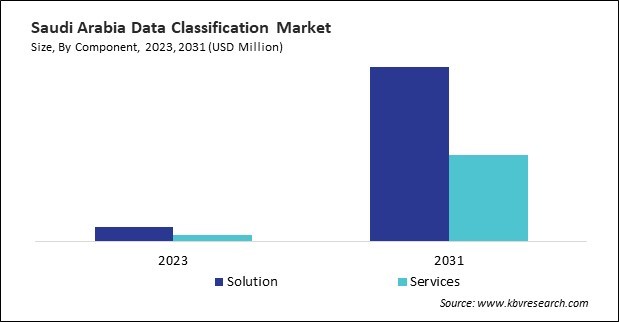The Latin America, Middle East and Africa Data Classification Market would witness market growth of 37.2% CAGR during the forecast period (2024-2031).
The Brazil market dominated the LAMEA Data Classification Market by Country in 2023, and would continue to be a dominant market till 2031; thereby, achieving a market value of $257.6 million by 2031. The Argentina market is showcasing a CAGR of 39.1% during (2024 - 2031). Additionally, The UAE market would register a CAGR of 36% during (2024 - 2031).

These solutions are essential for implementing and enforcing data governance frameworks. They provide a structured approach to managing data assets, ensuring data quality, and supporting data stewardship initiatives. Classification helps track data lineage and provenance by categorizing data based on its source and usage, which is important for maintaining data integrity and supporting auditing processes.
Classifying data according to its sensitivity and value enables organizations to better identify and prioritize critical data, enabling more effective risk management and mitigation strategies. Classification also aids in managing data-related insurance and liability by documenting the types of data protected and their associated risks, which can be useful for negotiating coverage and managing claims.
Saudi Arabia’s push for digitalization includes developing integrated health information systems that connect various healthcare providers. These solutions are critical in Saudi Arabia for organizing data across these platforms and ensuring seamless information flow. In March 2022, Saudi Arabia launched Seha Virtual Hospital, the largest e-health provider of its kind in the world and the first in the Middle East. Brazil’s booming EdTech startup ecosystem contributes to developing innovative educational technologies. These solutions in Brazil support these startups by providing tools to manage and categorize data related to educational content, user interactions, and learning outcomes. As Brazilian EdTech startups focus on personalized learning experiences, data classification helps organize and analyze student data to tailor educational content and enhance learning outcomes. Thus, rising digitalization in healthcare and expansion of the EdTech industry in the region is driving the market's growth.
Free Valuable Insights: The Worldwide Data Classification Marketis Projected to reach USD 12.0 Billion by 2031, at a CAGR of 34.3%
Based on Component, the market is segmented into Solution, and Services. Based on Application, the market is segmented into GRC, Centralized Management, Web, Mobile & Email Protection, and Access Control. Based on Classification, the market is segmented into User-Based Classification, Content-Based Classification, and Context-Based Classification. Based on Vertical, the market is segmented into BFSI, Defense & Government, Healthcare & Life Sciences, Telecom, Education, Media & Entertainment, and Other Vertical. Based on countries, the market is segmented into Brazil, Argentina, UAE, Saudi Arabia, South Africa, Nigeria, and Rest of LAMEA.
By Component
By Application
By Classification
By Vertical
By Country
Our team of dedicated experts can provide you with attractive expansion opportunities for your business.

